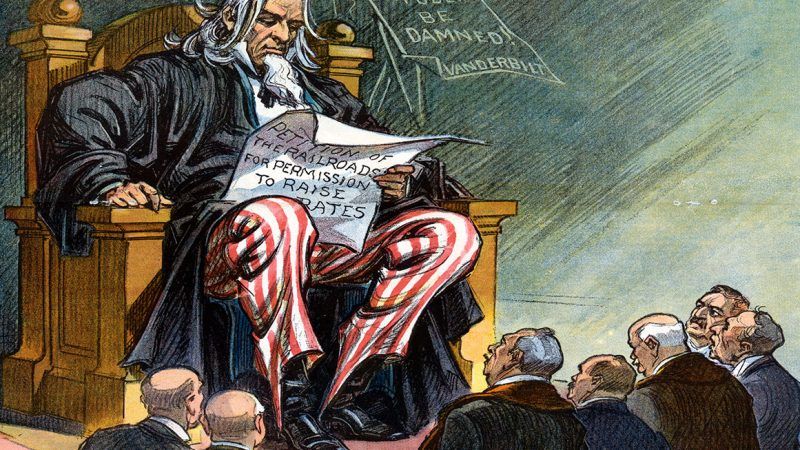Elizabeth Warren's Terrible Model for Tech Regulation
Bad ideas never seem to truly die in Washington.

The Interstate Commerce Commission (ICC), which existed for about a century before being mercifully put out to pasture in 1995, is one of the best historical examples of how governmental attempts at regulating the economy can backfire.
Created with the stated goal of protecting consumers from the competitive interests of Gilded Age railroad barons, the ICC was quickly captured by the very special interests it sought to control, then helped entrench a railroad cartel. At the height of its powers, the ICC tried to limit the use of trucks for hauling freight (an effort that thankfully failed) and used its influence to have a critic of the railroad monopoly committed to an asylum.
Naturally, some senators see the ICC as the ideal model for a new agency aimed at regulating Big Tech. Bad ideas never seem to truly die in Washington.
While promoting their bipartisan bill to ramp up federal regulation of successful tech companies in The New York Times, Sens. Lindsey Graham (R–S.C.) and Elizabeth Warren (D–Mass.) pointed to the ICC as one model for what they aim to do. "It's time to rein in Big Tech," they argued, "and we can't do it with a law that only nibbles around the edges of the problem." Warren has also invoked the ICC in posts on X (formerly known as Twitter) and in public comments calling for tighter federal control over companies like Amazon and Facebook.
Indeed, their bill wouldn't nibble. It would create a new federal commission to regulate online platforms. The Digital Consumer Protection Commission would have concurrent jurisdiction (which really means overlapping and duplicative mandates) with the Federal Communications Commission (FCC) and the Department of Justice. In the senators' telling, this newfangled ICC would aim to "preserve innovation while minimizing harm presented by emerging industries."
That's far from the whole story of the original ICC.
Created in 1887 with the noble goal of setting "just and reasonable" rates for freight carried by trains across state lines, the ICC "frequently hindered innovation, sometimes drastically," wrote Richard N. Langlois, an economics professor at the University of Connecticut, in The Wall Street Journal in August. It and other federal agencies like the FCC that have been created to regulate private businesses are "generally politicized and opaque," he warned. "And they often worked against the long-term interests of consumers."
Once the railroads and other shipping interests had effectively captured the ICC, it became a convenient tool for limiting competition from other forms of transportation too. Thomas Gale Moore, an economic historian and onetime member of President Ronald Reagan's Council of Economic Advisers, has written that "persistent lobbying" from the railroads helped bring the relatively new trucking industry "under the control of the ICC" starting in 1935.
After that, the trucking companies had to get a "certificate of public convenience and necessity" from the ICC to operate across state lines. While existing companies were easily granted those permission slips, Moore wrote, new companies "found it extremely difficult to get certificates." Additionally, companies regulated by the ICC had to post their freight rates publicly (for all competitors to see) and were limited in how often they could make changes. Those policies did little to protect the public but obviously benefited the railroads by slowing the growth of trucking as an alternative.
In one of the more bizarre anecdotes in federal regulatory history, the ICC played a role in institutionalizing inventor Eben Moody Boynton, who in 1920 claimed to have invented a new type of railroad model that required only a single track to operate. It took two months and the intervention of a Massachusetts congressman before Boynton was freed. (Boynton's so-called bicycle railroad idea never caught on, but that hardly seems to justify the ICC's efforts to silence him.)
By 1980, with the railroad industry nearing the end of a long decline that was due in no small part to the ICC's cartelization of the industry, Milton Friedman singled out the commission in his book Free to Choose as the paramount illustration of what he called "the natural history of government intervention." What he wrote about the history of the ICC is a particularly prescient warning for anyone encouraging federal regulation of technology and social media.
"A real or fancied evil leads to demands to do something about it. A political coalition forms consisting of sincere, high-minded reformers and equally sincere interested parties," Friedman wrote. The reformers create a new agency to do the work they believe is in the best interest of consumers, but "the interested parties go to work to make sure that the power is used for their benefit. They generally succeed."
That same year, Congress effectively sidelined the ICC with the passage of laws to deregulate the trucking and rail industries. In the absence of the anti-competitive bottleneck created by the ICC, freight railroads have reversed a decadeslong decline and are thriving. Consumers are reaping the benefits: Average rail shipping rates have declined by 40 percent, when adjusting for inflation, in the past 40 years, according to the Association of American Railroads.
The idea that new federal regulatory agencies are in the best interest of consumers was outdated over 40 years ago. The ICC originated because the Elizabeth Warrens and Lindsey Grahams of the late 1800s sought to use federal power to take on the "Big Tech billionaires" of their time. The ICC's myriad failures should be a warning for policy makers today, not a model to be duplicated.


Show Comments (35)